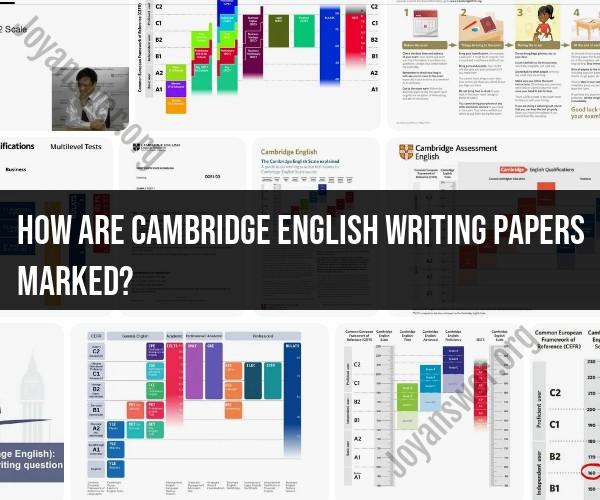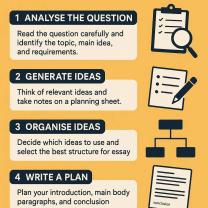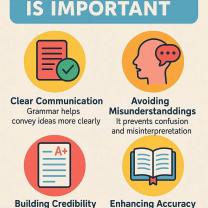How are Cambridge English writing papers marked?
Cambridge English writing papers are typically marked by trained examiners who follow specific guidelines and criteria to ensure fair and consistent evaluation of candidates' writing abilities. The marking process for Cambridge English writing papers, such as the IELTS, First (FCE), Advanced (CAE), and Proficiency (CPE) exams, generally involves the following key elements:
Marking Criteria:
Cambridge English provides detailed marking criteria that examiners use to assess written responses. These criteria typically include aspects like content, communicative achievement, organization, language, and accuracy. Examiners are trained to evaluate these aspects and assign scores accordingly.
Examiner Training:
Cambridge English conducts thorough training for examiners to ensure they understand the marking criteria and can apply them consistently. Examiners are often experienced English language professionals with a strong understanding of the language's nuances.
Double Marking:
In many cases, two different examiners independently mark the same paper. If there is a significant difference in their scores, a third examiner may review the paper to ensure fairness and consistency. This double marking helps maintain the reliability of the assessment.
Sample Responses:
Examiners often have access to sample responses that illustrate different levels of performance for each writing task. These samples serve as benchmarks to help them assign scores.
Level Descriptors:
Each Cambridge English exam has specific level descriptors that describe the expected abilities and performance at different proficiency levels. Examiners use these descriptors to determine the candidate's level and assign scores accordingly.
Feedback and Moderation:
Examiners receive feedback and participate in regular moderation meetings to ensure that their marking aligns with the established standards. This process helps maintain consistency across different examiners.
Scoring Scales:
Each writing task is assigned a score based on the specific criteria. The overall score for a writing paper is often a combination of scores for different tasks, and this may be scaled to produce a final score or grade.
Comments and Feedback:
Examiners may provide comments or feedback on candidates' papers to explain why they received a particular score or to offer suggestions for improvement. However, the primary assessment is based on the scoring criteria.
Data Security and Quality Control:
Cambridge English institutes strict data security and quality control measures to ensure the integrity and confidentiality of the marking process.
It's important to note that the specific marking process and criteria may vary slightly between different Cambridge English exams. Candidates should review the relevant exam-specific guidance to understand how their writing papers will be marked and how they can maximize their performance. Additionally, Cambridge English provides resources and sample papers to help candidates prepare for the writing tasks and gain a better understanding of the expectations for each level.
Marking Cambridge English Writing Papers: Guidelines and Criteria
Cambridge English writing papers are marked by trained examiners who use a set of guidelines and criteria to assess students' writing skills. The guidelines and criteria are based on the Common European Framework of Reference for Languages (CEFR), which is an international standard for describing language proficiency.
The following are the key criteria that examiners use to mark Cambridge English writing papers:
- Content: Does the writing fulfill all the requirements of the task? Does it include all the necessary information?
- Communicative achievement: Is the writing clear and easy to understand? Does it communicate the student's ideas effectively?
- Organization: Is the writing well-organized and easy to follow? Are the ideas presented in a logical order?
- Language: Does the student use a range of appropriate language? Is the language accurate and grammatically correct?
Evaluating Writing Skills in Cambridge English Exams
Examiners evaluate students' writing skills in Cambridge English exams by considering all four of the criteria listed above. Each criterion is given a score of 0 to 5, with 5 being the highest score. The overall score for the writing task is then calculated by averaging the scores for the four criteria.
Scoring and Assessment Methods for Writing Tasks
Cambridge English writing tasks are scored using a six-point scale, with 6 being the highest score and 1 being the lowest score. The following is a brief description of each score point:
- 6: Excellent
- 5: Very good
- 4: Good
- 3: Satisfactory
- 2: Weak
- 1: Very weak
Examiners use a variety of methods to assess writing tasks. These methods may include:
- Checking for content: Examiners check to make sure that the writing fulfills all the requirements of the task and includes all the necessary information.
- Assessing communicative achievement: Examiners consider how clear and easy the writing is to understand. They also assess how well the writing communicates the student's ideas.
- Evaluating organization: Examiners look at how well-organized the writing is and how easy it is to follow. They also assess how logically the ideas are presented.
- Analyzing language use: Examiners consider the range of language that the student uses. They also assess the accuracy and grammatical correctness of the language.
Feedback and Improvement in Cambridge English Writing
Students receive feedback on their writing performance from their examiners. This feedback can help students to identify their strengths and weaknesses and to develop their writing skills.
In addition to the feedback from their examiners, students can also improve their writing skills by practicing writing regularly. They can also seek feedback from their teachers and peers.
Excellence in Written Communication with Cambridge English
By preparing for and taking Cambridge English exams, students can develop the excellent written communication skills that they need to succeed in their academic and professional lives.
Cambridge English exams are designed to assess students' ability to communicate effectively in a variety of written contexts. By completing these exams, students can demonstrate to universities and employers that they have the writing skills necessary to succeed.
Here are some tips for excellence in written communication with Cambridge English:
- Practice writing regularly: The more you write, the better your writing skills will become. Try to write in a variety of contexts, such as for school, work, and pleasure.
- Seek feedback from others: Ask your teachers, peers, and family members to read your writing and give you feedback. This feedback can help you to identify areas where you can improve.
- Use a variety of language: When you are writing, try to use a variety of sentence structures and vocabulary. This will make your writing more interesting and engaging to read.
- Proofread your work carefully: Before you submit your writing, be sure to proofread it carefully for any errors in grammar or spelling.
By following these tips, you can develop the excellent written communication skills that you need to succeed in your academic and professional life.













